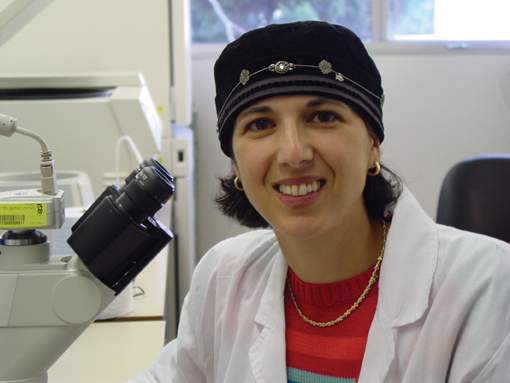
Appearing on Scientific American’s list of 50 leading scientists, businessmen and policymakers for the year 2006 places Dr. Shulamit Levenberg in position as a world leader in tissue engineering.
According to Levenberg, now a senior lecturer in the Biomedical Engineering Department at the Technion – Israel Institute of Technology in Haifa, it was her days as a graduate student at the Weizmann Institute’s Feinberg Graduate School that shaped her future as a scientist.
“People come to Weizmann out of a love of science,” she says. “There is a special research atmosphere at the Institute, in the midst of its beautiful lawns and trees.” Levenberg recalls the Feinberg “rotation” system – a unique approach enabling master’s students to become exposed to various research fields and methods before choosing a topic. “This approach was one of the reasons I chose Feinberg: It enables you to begin your graduate work by experiencing numerous fields and techniques, allowing you to keep all your options open before making a final decision.”
Levenberg’s third rotation stop, in Prof. Benjamin Geiger’s lab in the Molecular Cell Biology Department, led directly to her Ph.D. program: Her doctoral work focused on communication between cells. Relying on Geiger’s collaborations with experts in materials science, microscopy and computing, she learned to incorporate information from diverse fields of research. “Prof. Geiger’s ability to bring people from different fields together to solve a scientific question gave me inspiration,” she says. “Beyond the technical methods, Weizmann scientists and students gave me essential tools: how to plan an experiment, how to solve problems, how to think.”
She also remembers with nostalgia the social gatherings of the research group, the encounters in the hallways and the walks in the orchards adjoining the Institute. This was a particularly intensive period: In parallel to her scientific work, she married and started a family. But her personal life was by no means an obstacle: Trusting his students’ motivation, Geiger grants them a great deal of independence, allowing them to place family concerns high on their list of priorities.
Upon completing her Ph.D., Levenberg pursued postdoctoral studies in the tissue engineering lab of Prof. Robert Langer at the Massachusetts Institute of Technology. Her research, which earned her recognition in Scientific American, is an important milestone in the effort to create artificial tissues that promise one day to replace damaged human organs. Together with the lab’s multidisciplinary team of engineers, computer scientists, chemists and biologists, Levenberg generated muscle tissue using a network of blood vessels. The tissue was successfully implanted in mice and even promoted growth of the new blood vessels essential for feeding the transplanted cells, thus overcoming one of the greatest obstacles to tissue transplantation.
After her postdoctoral studies, Levenberg returned to Israel and joined the Technion, receiving the faculty position of senior lecturer and becoming head of a laboratory in the Biomedical Engineering Department, where she continues her work in tissue engineering.
In facing the daily challenge of managing a lab, she goes back to the guidance she received from her two mentors, Geiger and Langer, when supervising her own students: “Whenever I run into questions, I try to think how they would have acted and try to draw lessons from their knowledge and experience.”
